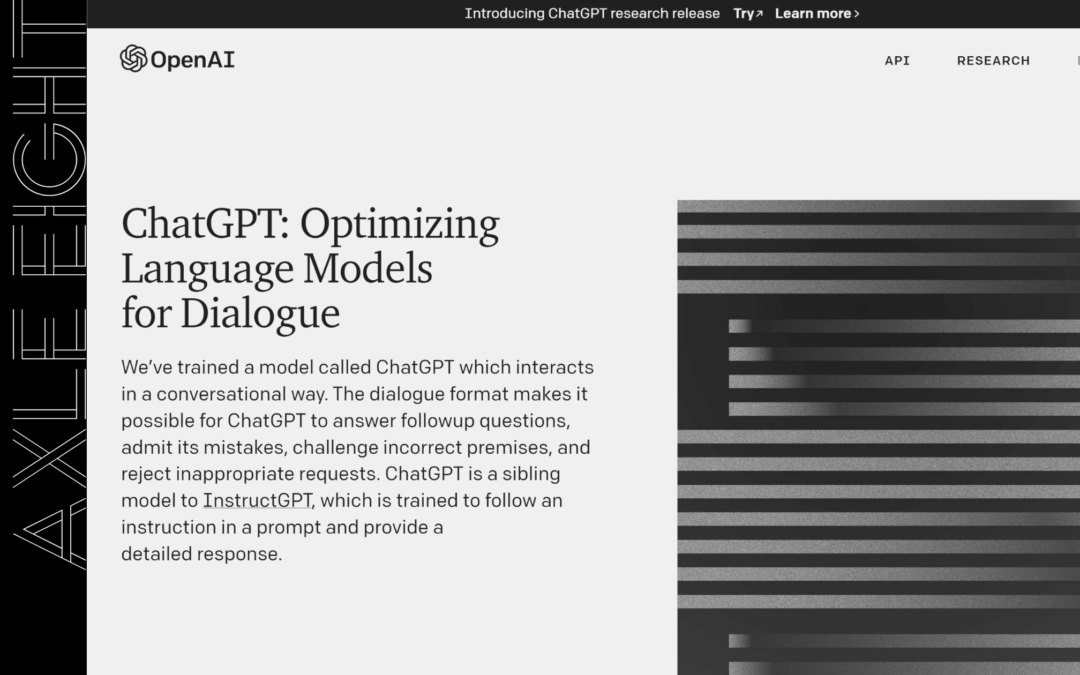ChatGPT, or Chat-based Generative Pretrained Transformer, is a new language model developed by OpenAI (co-founded by Elon Musk) that has the potential to revolutionize the field of search engine optimization (SEO) in absolutely enormous ways. In this blog we’ll explore how ChatGPT works, how it differs from other language models, and how it could impact the world of SEO in the future.
What is ChatGPT?
First, let’s talk about what ChatGPT is and how it works. ChatGPT is a large language model that uses deep learning techniques to generate human-like responses to natural language queries. It was trained on a vast amount of text data, including conversations, books, and articles, and has been specifically designed to understand the nuances and subtleties of human language.
One of the key ways that ChatGPT differs from other language models is that it is designed to be “interactive.” This means that it can continue a conversation and generate responses based on previous input, allowing for more natural and fluid conversations. This is in contrast to other language models, which often generate responses based on a single query without taking into account previous input.
How will ChatGPT change SEO as we know it?
So, how does this relate to SEO? Well, one of the biggest challenges in the world of SEO is understanding and predicting how people search for information online. Search engine algorithms, such as Google’s, are designed to provide users with the most relevant and useful results for their queries, but this can be difficult to do when people use complex, multi-faceted language to express their needs.
More Accurate, In-Depth Results for What You’re Searching For
ChatGPT, with its ability to understand and respond to natural language queries, has the potential to make search algorithms more effective and more accurate. By “listening” to a user’s query and generating responses based on that query, ChatGPT could help search engines better understand the intent behind a user’s search, and provide more relevant and useful results.
One potential way that ChatGPT could disrupt Google is by improving the accuracy and relevance of search results. As mentioned earlier, ChatGPT is trained on a vast amount of text data and is designed to understand the nuances and subtleties of human language. This means that it has the potential to better understand the intent behind a user’s search query and provide more relevant and useful results. If ChatGPT is able to provide significantly better search results than Google, it could potentially attract users away from Google and disrupt its dominant position in the search engine market.
Improving Website Experiences
Another potential way that ChatGPT could disrupt SEO and Google is by improving the user experience on websites. ChatGPT could be used to power chatbots on websites, allowing users to ask questions and receive helpful, human-like responses in real time. This could improve the user’s experience on a website, potentially leading to higher engagement and conversions. If ChatGPT is able to significantly improve the user experience on websites, it could potentially give businesses a competitive advantage over those using Google’s search engine, which could disrupt Google’s dominance in the market.
ChatGPT Can Write Relevant and Optimized Content For Your Business
Finally, ChatGPT could also have a big impact on the way that content is created for the web. As we mentioned earlier, ChatGPT is trained on vast amounts of text data, including conversations, books, and articles. This means that it has a deep understanding of human language and how it is used. By leveraging this knowledge, writers and content creators could use ChatGPT to generate high-quality, engaging content that is optimized for search engines. If businesses are able to use ChatGPT to generate better content than their competitors, it could absolutely give them an edge in the search engine rankings and cause complete disruption to everything we know about SEO today.
Overall, ChatGPT has the potential to be a game-changer in the world of SEO. Its ability to understand and respond to natural language queries, improve the user experience on websites, and generate high-quality content could help search engines provide more relevant and useful results, and help businesses better engage and convert their audience. While it’s still early days for ChatGPT, there’s no doubt that this technology has the potential to revolutionize the world of SEO in the future.
At Axle Eight, we’re looking at ways all of our clients can begin to utilize the power of this technology today. If you’re interested in working with a forward-thinking agency, get in touch with us!

